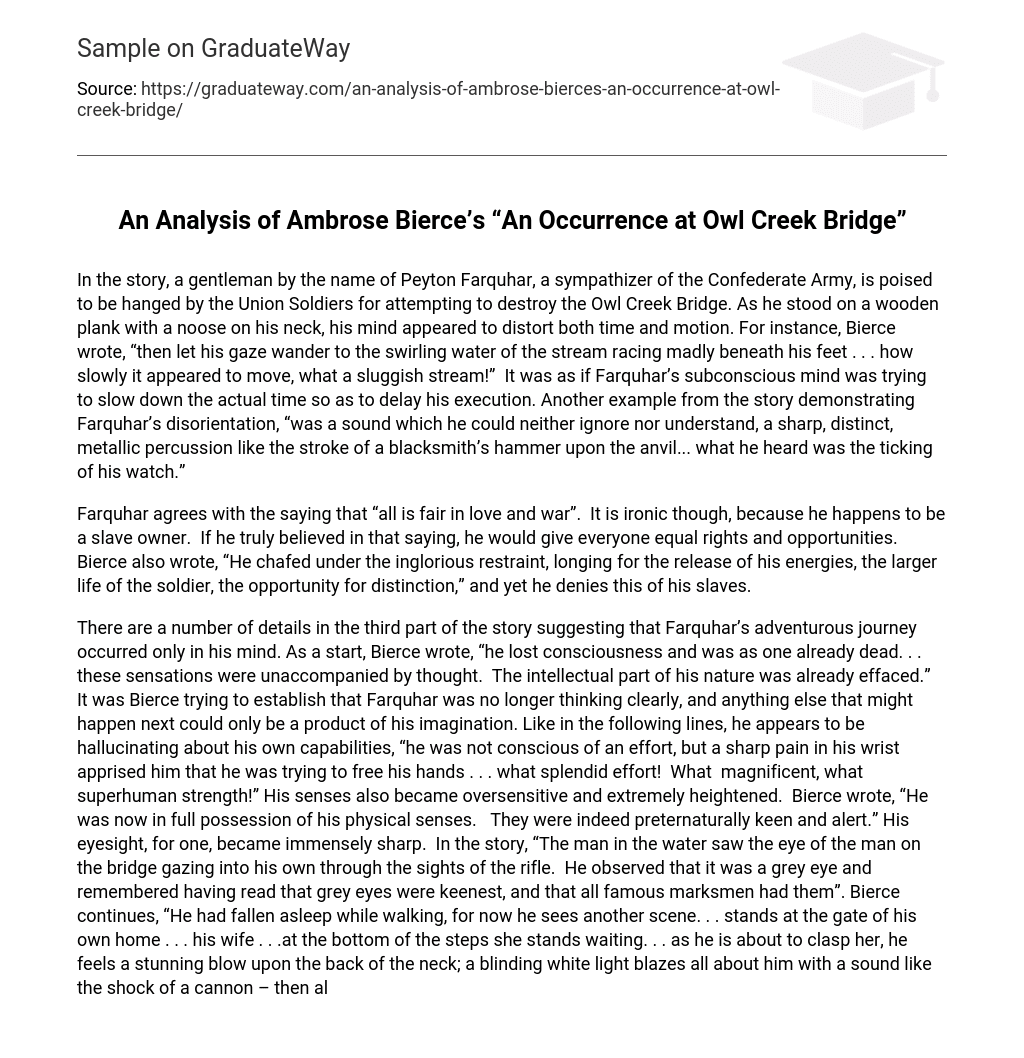In the story, a gentleman by the name of Peyton Farquhar, a sympathizer of the Confederate Army, is poised to be hanged by the Union Soldiers for attempting to destroy the Owl Creek Bridge. As he stood on a wooden plank with a noose on his neck, his mind appeared to distort both time and motion. For instance, Bierce wrote, “then let his gaze wander to the swirling water of the stream racing madly beneath his feet . . . how slowly it appeared to move, what a sluggish stream!” It was as if Farquhar’s subconscious mind was trying to slow down the actual time so as to delay his execution. Another example from the story demonstrating Farquhar’s disorientation, “was a sound which he could neither ignore nor understand, a sharp, distinct, metallic percussion like the stroke of a blacksmith’s hammer upon the anvil… what he heard was the ticking of his watch.”
Farquhar agrees with the saying that “all is fair in love and war”. It is ironic though, because he happens to be a slave owner. If he truly believed in that saying, he would give everyone equal rights and opportunities. Bierce also wrote, “He chafed under the inglorious restraint, longing for the release of his energies, the larger life of the soldier, the opportunity for distinction,” and yet he denies this of his slaves.
There are a number of details in the third part of the story suggesting that Farquhar’s adventurous journey occurred only in his mind. As a start, Bierce wrote, “he lost consciousness and was as one already dead. . . these sensations were unaccompanied by thought. The intellectual part of his nature was already effaced.” It was Bierce trying to establish that Farquhar was no longer thinking clearly, and anything else that might happen next could only be a product of his imagination. Like in the following lines, he appears to be hallucinating about his own capabilities, “he was not conscious of an effort, but a sharp pain in his wrist apprised him that he was trying to free his hands . . . what splendid effort! What magnificent, what superhuman strength!” His senses also became oversensitive and extremely heightened. Bierce wrote, “He was now in full possession of his physical senses. They were indeed preternaturally keen and alert.” His eyesight, for one, became immensely sharp. In the story, “The man in the water saw the eye of the man on the bridge gazing into his own through the sights of the rifle. He observed that it was a grey eye and remembered having read that grey eyes were keenest, and that all famous marksmen had them”. Bierce continues, “He had fallen asleep while walking, for now he sees another scene. . . stands at the gate of his own home . . . his wife . . .at the bottom of the steps she stands waiting. . . as he is about to clasp her, he feels a stunning blow upon the back of the neck; a blinding white light blazes all about him with a sound like the shock of a cannon – then all is darkness and silence! Peyton Farquhar was dead; his body, with a broken neck, swung gently from side to side beneath the timbers of the Owl Creek Bridge.” His mind allowed him to travel and glance upon his wife one last time before he died. Such was the power of the human psyche.
The limited third person point of view works best for this story because it makes it more dramatic and focused. After all, the main point is the workings of Farquhar’s mind, which is where most of the turmoil takes place.
Work Cited
- Bierce, Ambrose. “An Occurrence at Owl Creek Bridge.” Fiction the EServer Collection. 1994-2010.
- 20 July 2010<http://fiction.eserver.org/short/occurrence_at_owl_creek.html.





